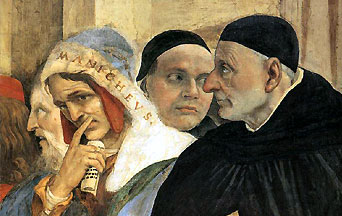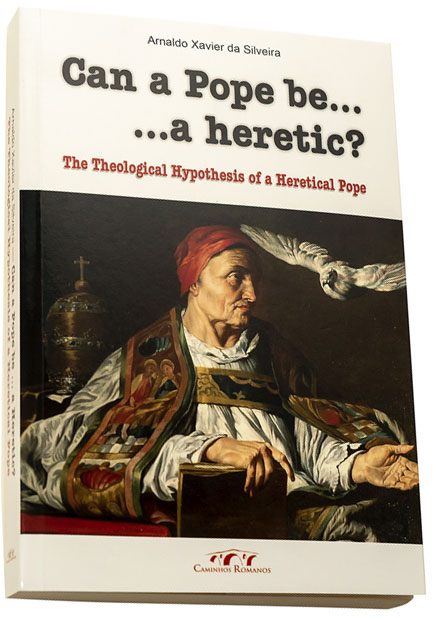
“The Pope Manifestly a Heretic Ceases by Himself to Be Pope”
“The Pope Manifestly a Heretic Ceases by Himself to Be Pope”
In a previous article we did a quick examination of heresy in general, and how it is incompatible with ecclesiastical jurisdiction.
We concluded that the abandonment of the Catholic Faith corresponds to a tacit resignation of any ecclesiastical office, since those who are no longer part of the Church cannot enjoy any jurisdiction in it.1
We will now examine, albeit briefly, the theological hypothesis of a heretical pope.
A Hypothesis Grounded in Theological and Canonical Tradition
In his book, Can a Pope Be…a Heretic? The Theological Hypothesis of a Heretical Pope, Brazilian professor Arnaldo Vidigal Xavier da Silveira (d. 2018) having studied more than a hundred renowned authors, including Doctors of the Church, concluded that there is nothing in Divine Revelation that asserts the impossibility of a pope falling into heresy when not teaching ex cathedra.2
In fact, in order for it to be impossible for a pope to commit the sin of heresy, it would be necessary that he could not commit any mortal sin or err in anything that he said or did. Now this would require, on the one hand, that every pope be confirmed in grace, and, on the other, that he enjoy absolute and all-encompassing infallibility. Yet nothing in Revelation says that Our Lord gave Saint Peter’s successors confirmation in grace (which so strengthens a person that he never commits mortal sins), as He granted to the Apostles at Pentecost. Nor is there any promise of an absolute and all-encompassing infallibility.
Lessons From History
An objective study of Church History shows that some popes led a life that was hardly edifying, to say the least, giving scandal.3
As to the charisma of personal infallibility, the First Vatican Council made it clear that the pope only enjoys infallibility “when he speaks ex cathedra, that is, when carrying out the duty of the pastor and teacher of all Christians by virtue of his supreme apostolic authority he defines a doctrine of faith or morals to be held by the universal Church.”4 Outside these strict limits, the pope can err.5
Maintaining Love for the Papacy
When analyzing this delicate question, we must defend our love for the papacy, for the pontifical monarchy, and for the principle of unity in the Church. A stalwart example in this regard is Prof. Plinio Corrêa de Oliveira (1908–1995)—founder of the Brazilian Society for the Defense of Tradition, Family, and Property—when he issued a declaration of resistance to Pope Paul VI’s policy of rapprochement with communist regimes. At the same time that he resisted this policy, Prof. Corrêa de Oliveira sang a hymn of praise to the papacy.6
The Pope’s Supreme Power
The fundamental principle to keep in mind when analyzing the question of a heretical pope is that the pope enjoys the “supreme and full power of jurisdiction in the universal Church.” This is what has always been taught and is enshrined in the Codes of Canon Law, both old and new.7 The theological basis for this statement is found in Saint Matthew (16:18–19).8 It affirms the primacy and supreme authority of the pope in a clear and unmistakable way.9
Therefore, since no one has jurisdiction over the pope, he cannot be the object of any judicial action. His authority is supreme, “without appeal or recourse to any other human power, not even the Ecumenical Council.”10 He is subject to divine and natural law, but not to purely ecclesiastical laws.
Saint Robert Bellarmine: “The Pope Manifestly a Heretic Ceases by Himself to Be Pope”
If no one is above the pope, and, therefore, in a position to admonish, judge, or depose him judicially when he is pertinacious in his heresy, has Our Lord left His Church defenseless? No. As seen in a previous article,11 because of the very nature of the sin of heresy, the heretic expels himself from the Church. Based on this principle, Saint Robert Bellarmine (1542–1621) affirms that the heretic pope ceases to be a member of the Church. Moreover, the great Doctor of the Church teaches that when the pope’s heresy becomes public and notorious he ceases to be the Church’s head. Great theologians and canonists like Ballerini, Wernz-Vidal, and others, subscribe to and defend Saint Robert Bellarmine’s theological opinion.12
According to the great Jesuit saint, “The pope manifestly a heretic ceases by himself to be pope and head [of the Church], in the same way as he ceases to be a Christian and a member of the body of the Church; and for this reason he can be judged and punished by the Church. This is the opinion of all the ancient Fathers, who teach that manifest heretics lose immediately all jurisdiction.”13
 Learn All About the Prophecies of Our Lady of Good Success About Our Times
Learn All About the Prophecies of Our Lady of Good Success About Our Times
This Doctor of the Church insists that someone who has ceased being a member of the Church, because of manifest heresy, cannot be its head: “Now, he who is not a Christian is not a member of the Church, and a manifest heretic is not a Christian, as is clearly taught by Saint Cyprian (lib. 4, epist. 2), Saint Athanasius (Ser. 2 cont. Arian.), Saint Augustine (lib. de grat. Christ. cap. 20), Saint Jerome (cont. Lucifer.) and others; therefore, the manifest heretic cannot be pope.”14
Earlier, Saint Robert Bellarmine observed that “the argument for authority is based on Saint Paul (Epist. ad Titum, 3) who orders that the heretic be avoided after two warnings, that is, after showing himself to be manifestly obstinate—which means before any excommunication or judicial sentence.”15
Who Can Admonish the Pope?
Since the principal argument of authority over the loss of the papacy by a heretical pope is Saint Paul’s commandment to Titus to avoid a heretic after two admonitions, the question becomes: Who is to make such admonitions?
Trying to refute Saint Robert Bellarmine’s criticism of the opinion of Thomas Cardinal Cajetan, O.P. (1469–1534), Dominican theologian John of St. Thomas (1589–1644) affirms that these two admonitions must have a juridical character,16 that a general Council must be summoned, and it should promulgate a declaratory sentence of the pope’s crime of heresy.17 He does not accept notoriety in fact of papal heresy, but only notoriety in law (juridice notoria).18
Saint Robert Bellarmine had already refuted this position in his Cajetan critique.
In fact, this theological position—which one might call the Cajetan-John of St. Thomas position—implicitly affirms that the bishops have some form of jurisdiction over the pope since the latter can only be legally warned by someone who is somehow above him. However, this runs counter to the Church’s constant teaching on the universal and supreme jurisdiction of the Roman Pontiff. Thus, the Cajetan-John of St. Thomas position must be rejected.
The Heretic Excludes Himself From the Church, “Being Condemned by His Own Judgment”
Wernz-Vidal makes it clear that a Council cannot make a declaratory sentence that deprives the pope of his power for this would be an inferior passing sentence on his superior. A sentence can be admitted, however, if it is a mere finding of the crime committed (and not a legally binding declaratory sentence). In this case, the sentence would not be judging the legitimate pope but only declaring that he is already judged by his act of adherence to heresy and that, by that act, he has deprived himself of his dignity and office.19
Not a Juridical Act, but One of Charity
In this regard, the position most in accordance with the traditional theological and canonical doctrine is that of Pietro Ballerini (1698–1769). This eminent Italian theologian demonstrated that the warnings commanded by Saint Paul in relation to the pope are not an act of jurisdiction, but of charity. Therefore, he concluded, anyone can do it, even a layman, for “any subjects can, by fraternal correction, warn their superior” since “for any person, even a private person, the words of Saint Paul to Titus hold: ‘Avoid the heretic.’”20
Not a Deposition but a Tacit Resignation
Summarizing the thought of Saint Robert Bellarmine, Xavier da Silveira says: “For the Jesuit Saint, no one deposes the pope, but he himself leaves the visible Church upon manifesting his heresy. Hence, he loses the Pontificate even if he remains in the Apostolic Palaces and tries to keep both his post and Church governance. This is an abdication, a tacit resignation,21 for to renege the Faith is an act incompatible with the papacy.”22
Xavier da Silveira continues:
All other opinions on how a heretic loses the pontificate presuppose at least one jurisdictional act by the imperfect Council (that is, the Council without the pope), the College of Cardinals, or some other ecclesiastical organ. The only opinion of the classical doctors that does not resort to a jurisdictional pronouncement against the still reigning pope is the fifth opinion of St. Robert Bellarmine, also adopted, complemented and enriched on some points by Ballerini, Wernz-Vidal, Billot and others.23
Saint Robert Bellarmine’s Position Is Not Sedevacantism
Since the doctrine of Saint Robert Bellarmine does not approve or accept juridical acts of a Council or bishops deposing or declaring that a pope is no longer pope, one may ask: Does his position not lead to sedevacantism?

It is quite evident that a saint and Doctor of the Church, and one of the greatest Catholic polemicists to boot, could never defend the error of sedevacantism.
The point is to properly understand his doctrine. The error stems from not knowing how to properly apply his doctrine that a heretic pope whose heresy is manifest ceases of himself to be pope. In other words, it is wrong to apply his doctrine in a simplistic way, “without paying attention to the principle that in a visible and perfect society such as the Church, the fundamental facts of its life such as the acquisition or loss of leadership must be known to the social body.”24
To apply his doctrine correctly, the manifest heresy of a heretic pope must be widely known among the faithful. When, therefore, a heretic pope’s manifest heresy has attained this widespread knowledge, and it is clear that he is no longer pope, then conditions are set for further actions by the hierarchy.
As Xavier da Silveira explains, “The Apostolic See being vacant, an ecclesiastical organ such as the College of Cardinals or the imperfect Council can legally declare the loss of office by the heretic who was Pope, to render the fact official and make it unequivocally known by all, proceeding to elect a new Pontiff.”25
The “Bellarmine Thesis” Is Not Practical
Others may assail Saint Robert Bellarmine’s position saying that it is not practical since it does not present any juridical means capable of forcing the removal of a heretical pope from office.
The great saint did not do this because he could not. Had he done so, he would have fallen into conciliarism,26 like others who posit the thesis of the need of a judicial act of deposition.
No, unfortunately there is no “practical solution” for this case. We must be faithful to the traditional doctrine of the papacy and confide in Our Lord’s special assistance in the dramatic situation. For this divine assistance we need to pray and offer sacrifices.
A Saint With Great Doctrinal Authority
One must take into account that of the three famous theologians—Suarez, Cajetan, and Bellarmine—whose theories on the manner in which a heretical pope loses the papacy have served as the basis for the study of this thorny question, only the great Jesuit cardinal was canonized and later made Doctor of the Church. This adds extrinsic value to the intrinsic worth of his clear, objective, and theologically irreproachable argumentation about a heretical pope.
Grace and the “Sensus Fidei” Will Effect a Solution
In situations of great confusion in the Church like today’s, it is necessary to rely on supernatural help, beseeching it more than in normal times, with prayer and sacrifice. Both the theoretical study and de facto evaluation of great questions such as that of a heretical pope should be guided by an intense love of the Church and a lively sensus fidei, the supernatural instinct of Faith.
According to Xavier da Silveira,
A Catholic movement in defense of the Faith will only have life and strength if it springs from the depth of souls inspired by the sensus fidei, which differs radically from natural tendencies. The sensus fidei is like a spiritual sense, which sees, appreciates, and judges all things in the light of the Faith. It is, as it were, the sensibility of a soul vivified by the gifts of the Holy Ghost and by infused virtues and actual graces that make present and lively the truths revealed by Our Lord, and wisdom, the savory science of the Faith.
Developing a Catholic Sense
This sensus fidei transcends the contingencies of the moment, gives fervent souls a firm doctrinal support, and guides their action in a line of orthodoxy and virtue that depends not only on external commands but is born of each faithful’s life of grace.27
In short, a special and superabundant help from grace is necessary to bring about that unity of bishops and faithful necessary to effect that a heretical pope abandon the externals of the Petrine Office—which he no longer holds—in a way that prevents further Church divisions and turmoil.

While Saint Robert’s theoretical explanation and solution are necessary, even indispensable, to see clearly the problem of a heretic pope, no situation of such gravity can be turned around without special graces.
We raise, therefore, our eyes to Fatima, to the promise of the Blessed Mother that finally—after the sufferings caused by the present crises in the Church and the world—her Immaculate Heart will triumph.
Tears, a Miraculous Warning
Without this hope, indeed this certainty, we will lack the strength to remain faithful in the present situation.
We look further to Saint Joseph, Patron of the Universal Church, to Saint Michael the Archangel, Protector of the Church, and to the glorious Saint Peter and his successors who, through holiness of life and integrity of faith made the Chair of Truth shine forth, and to whom Our Lord entrusted the keys to the Kingdom of Heaven: “Amen I say to you, whatsoever you shall bind upon earth, shall be bound also in heaven: and whatsoever you shall loose upon earth, shall be loosed also in heaven” (Matt. 18:18).
❮ Previous Article in this Series |
Footnotes
- Except in special cases in which the Church supplies the lack of jurisdiction in favor of the faithful.
- Arnaldo Vidigal Xavier da Silveira, Can a Pope Be…a Heretic? The Theological Hypothesis of a Heretical Pope, trans. John Spann (Portugal: Caminhos Romanos, 2018), 92, 93.
- See Ludwig Pastor, History of the Popes: From the Close of the Middle Ages (St. Louis, Mo.: Herder,1923–1952), 39 vols.
- First Vatican Council, Denzinger, no. 1839.
- See Arnaldo Xavier da Silveira, Can Documents of the Magisterium of the Church Contain Errors? Can the Catholic Faithful Resist Them? (Spring Grove, Penn.: The American Society for the Defense of Tradition, Family and Property—TFP, 2015).
- “The Vatican Policy of Détente with Communist Governments: Should the TFPs Stand Down? Or Should They Resist?” TFP.org, Feb. 18, 1975, https://tfp.org/vatican-policy-detente-communist-governments-tfps-stand-resist/.
- See canon 218 in the 1917 Code; canon 331 in the 1983 Code.
- “And I say to thee: That thou art Peter; and upon this rock I will build my church, and the gates of hell shall not prevail against it.”
- See Wernz-Vidal, Ius Canonicum, Apud Aedes Gregrorianae, 1943, II, no. 403, 462–3.
- Marcelino Cabreros de Anta, CMF, comment on canon 218, in Miguelez-Alonso-Cabreros, Codigo de Derecho Canonico Comentado (Madrid: BAC, 1953).
- Luiz S. Solimeo, “The Heretic Excludes Himself From the Church, ‘Being Condemned by His Own Judgment.’” TFP.org, July 3, 2019, https://tfp.org/the-heretic-excludes-himself-from-the-church-being-condemned-by-his-own-judgment.
- See Xavier da Silveira, Can a Pope Be…, 109–11.
- Saint Robert Bellarmine, De Rom. Pont., lib. II, cap. 30, 420, quoted in Arnaldo Xavier da Silveira, Can a Pope Be…, 82.
- Quoted in Xavier da Silveira, Can a Pope Be…, 77.
- Ibid.
- He says: “[A] heretic must be avoided as a result of two rebukes that have been made juridically by the Church’s authority and not according to private judgment.”(“[H]aereticum esse evitandum propter duas correptiones juridice scilicet factas, et ab ecclesiae auctoritate, et non privatum judicium.”) John of St. Thomas, Cursus Theologicus, Disputatio II, Art. III, no. XXVI, Ludovicus Vives, 1883–1886, 263.
- “The Declaration of the crime does not concern the cardinals but the general Council.” “Declaratinem criminis nullo modo pertiner ad cardinales, sed ad Concilium generale.” Ibid., 258.
- Ibid., 252.
- “The General Council [only] declares the fact of the crime by which the heretic Pope separated himself from the Church and deprived himself of his dignity.”(“Concilium generale declarat factum criminis, quo ipse Papa haereticus sese ab a Ecclesia separavit suaque dignitate privavit.”) Ius Canonicum, no. 453.
- Quoted in Xavier da Silveira, Can a Pope Be…, 81.
- Although the Code of Canon Law as such is not applicable to the pope, let us recall here the canonical doctrine expounded in canon 188 of the 1917 Code of Canon Law, that, through his heresy, a heretic loses his office by tacit resignation. See Solimeo, “The Heretic Excludes Himself.” (Bold in the original.)
- Xavier da Silveira, Can a Pope Be…, 110.
- Ibid.
- Ibid.,119–20.
- Ibid., 126 (Bold in the original).
- Conciliarism is an ecclesiological doctrine which affirms that an ecumenical council has supreme authority in the Catholic Church; in other words, that a general council of bishops constitutes a higher authority than the pope.
- Xavier da Silveira, Can a Pope Be…, 122.
